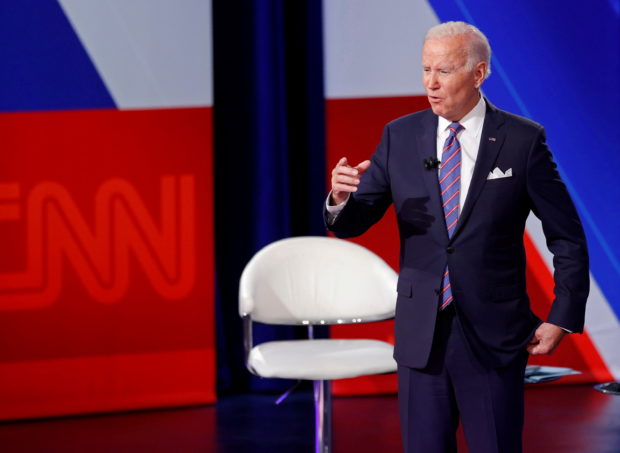White House repeats no Taiwan policy change; experts see Biden gaffe

FILE PHOTO: U.S. President Joe Biden speaks during a town hall about his infrastructure investment proposals with CNN’s Anderson Cooper at the Baltimore Center Stage Pearlstone Theater in Baltimore, Maryland, U.S. October 21, 2021. REUTERS/Jonathan Ernst/File Photo
WASHINGTON — The White House on Friday reiterated that Joe Biden was not signaling a change in U.S. policy toward Taiwan when he said the United States would come to the island’s aid if it was attacked by China, and analysts dismissed the president’s remark as a gaffe.
While Washington is required by law to provide Taiwan with the means to defend itself, it has long followed a policy of “strategic ambiguity” on whether it would intervene militarily to protect Taiwan in the event of a Chinese attack.
Biden called that into question when he was asked at a CNN town hall in Baltimore on Thursday night whether the United States would come to Taiwan’s defense if it was attacked by China and he replied: “Yes, we have a commitment to do that.”
Shortly after he spoke, a White House spokesperson said there was no change in policy and analysts said it appeared the president misspoke.
Asked at a Friday news briefing whether it was Biden’s intention to move away from strategic ambiguity to make an unambiguous statement about how the United States would respond to a Chinese attack on Taiwan, White House spokeswoman Jen Psaki said: “Our policy has not changed. He was not intending to convey a change in policy, nor has he made a decision to change our policy.”
Article continues after this advertisementPsaki added that, as stated in Brussels earlier on Friday by U.S. Defense Secretary Lloyd Austin, “nobody wants to see cross-strait issues come to blows, certainly not President Biden, and there’s no reason that it should.”
Article continues after this advertisementPsaki said the U.S. defense relationship with Taiwan was guided by the long-established Taiwan Relations Act, under which Washington would “continue assisting Taiwan in maintaining a sufficient self-defense capability.”
Another principle of the act was that Washington “would regard any efforts to determine the future of Taiwan by other than peaceful means a threat to the peace and security of the Western Pacific and of grave concern to the United States,” she added.
Bonnie Glaser, a Taiwan expert at the German Marshall Fund of the United States, called Biden’s remark a “gaffe” and said it was “patently not true” that Washington has a commitment to defend Taiwan.
“Some are suggesting a deliberate effort to send unclear signals, but in my view, that makes no sense. A confused U.S. policy weakens deterrence,” she said, noting that Biden’s Asia policy czar, Kurt Campbell, had rejected “strategic clarity” over Taiwan.
Another Taiwan expert, Douglas Paal, a former U.S. representative in Taipei, said Biden was focused at the town hall on selling his domestic economic agenda.
“Despite his reputation on foreign affairs, he can be occasionally sloppy when distracted,” Paal said. “The White House was right to issue a speedy ‘no-change-in-policy’ correction because that is where policy is.”
Biden’s remark comes at an awkward time, while White House officials are gearing up for a virtual meeting between him and Chinese leader Xi Jinping, which, sources say, they hope will show the world Washington can responsibly manage tense relations between the rival superpowers.
China, which claims self-ruled Taiwan as its own, expressed its displeasure, with a foreign ministry spokesman saying Beijing has no room for concessions on its core interests.
China urges the United States “not to send the wrong signals to the forces of Taiwan independence, to avoid seriously harming Sino-U.S. ties and peace and stability in the Taiwan Strait,” spokesman Wang Wenbin said.
Taiwan’s presidential office said its position remained the same, which is that it will neither give in to pressure nor “rashly advance” when it gets support.